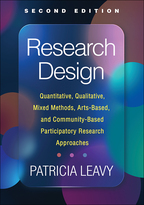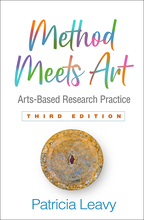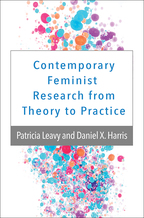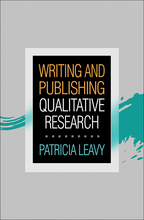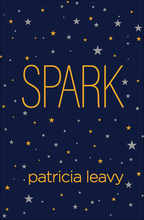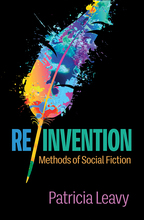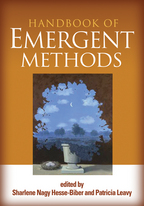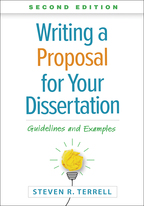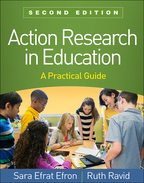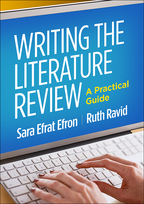Research Design
Second Edition
Quantitative, Qualitative, Mixed Methods, Arts-Based, and Community-Based Participatory Research Approaches
Patricia Leavy
HardcoverPaperbacke-bookprint + e-book
Hardcover
orderOctober 26, 2022
ISBN 9781462550883
Price: $83.00 323 Pages
Size: 7" x 10"
Paperback
orderNovember 30, 2022
ISBN 9781462548972
Price: $55.00323 Pages
Size: 7" x 10"
e-book
orderOctober 14, 2022
PDF and Accessible ePub ?
Price: $55.00 323 Pages
ePub is Global Certified Accessible
print + e-book $110.00 $66.00
orderPaperback + e-Book (PDF and Accessible ePub) ?
Price: 323 Pages
ePub is Global Certified Accessible
A Doody's Core Title for 2025!
Read a Q&A with featured author, Patricia Leavy!
Sign up for emails on upcoming titles by Patricia Leavy (with special discounts)!
Read a Q&A with featured author, Patricia Leavy!
Sign up for emails on upcoming titles by Patricia Leavy (with special discounts)!
“Leavy once again brings together leading-edge concepts in this articulate, highly readable, and comprehensive second edition. In a vibrant and engaging style, the book unpacks and explains the five foundational research approaches and offers expert tips and practical resources. The second edition sets a new standard for integration of social justice, cultural, and ethical issues in research design, particularly within community-based participatory approaches. This is a 'must-have' book that undoubtedly will be required reading for students and researchers in psychology, social sciences, and education.”

—Cathy A. Malchiodi, PhD, Trauma-Informed Practices and Expressive Arts Therapy Institute, Louisville, Kentucky
“Most of our doctoral students want to continue in their professional roles or organizations and do not plan to pursue research-intensive positions, so I need a text that will support them in conducting a solid study in an applied setting. Because our students come from diverse fields (educational leadership, hospital administration, and supply-chain management, for example), a text that offers a wide lens on research design is wonderful. I don't know of any other methods texts that are so straightforward and at the same time so inclusive regarding design approaches.”

—Kristina N. LaVenia, PhD, School of Educational Foundations, Leadership and Policy, Bowling Green State University
“The second edition builds on the strengths of the first as it continues to offer a wide range of information. The infographics illustrate key concepts, relationships, and the order of operations in a user-friendly manner. The checklists in each chapter are a great resource that ensure all parts of the process are considered and completed. Our students will benefit from the literature review chapter, which emphasizes the 'why' along with the 'how.' Leavy's emphasis on process is key to understanding and selecting appropriate methodologies as students prepare their proposals and conduct their own scholarship.”

—Pamela K. Brown, EdD, Department of Kinesiology, University of North Carolina at Greensboro
“The second edition of Research Design provides elegant, accessible writing and pragmatic content for students in the social and behavioral sciences. Unlike other introductory books on general research design, Leavy’s text maintains a strong focus on developing the written proposal, with its constituent elements such as targeted research questions, ethical considerations with participants, and appropriate uses of methodological terms. The second edition includes expanded coverage of the literature review, now in its own chapter, and discusses contemporary issues in arts-based and community-based projects. Leavy is an internationally renowned author who offers undergraduates and graduate students expert guidance on the templates necessary for initiating their studies.”

—Johnny Saldaña, MFA, Herberger Institute for Design and the Arts (Emeritus), Arizona State University
“Leavy has a real knack for making complex ideas and methods very easy to understand, which is especially helpful for teaching novice research students. Readers learn the nuts and bolts of research design, which includes a grounding in values, philosophy, and ethics that influence decision making. Readers can use the chapters to inform the development of a research design and proposal.”

—Tina Maschi, PhD, LCSW, ACSW, Graduate School of Social Service, Fordham University
“In her own measured, methodologically ecumenical way, Leavy manages both to undo some of the stock presumptions of social science research and to radically widen the boundaries of legitimate modes of inquiry. She builds important bridges between quantitative and qualitative approaches, theory and ethical praxis, and, not least, science and art. The result is a clear, thoughtful, and extremely valuable exploration of not only the 'nuts and bolts' of research design but also the purposes, philosophical premises, and concrete methodological practices that characterize social scientific inquiry in its many forms.”

—Mark P. Freeman, PhD, Distinguished Professor of Ethics and Society, Department of Psychology, College of the Holy Cross
—Cathy A. Malchiodi, PhD, Trauma-Informed Practices and Expressive Arts Therapy Institute, Louisville, Kentucky
“Most of our doctoral students want to continue in their professional roles or organizations and do not plan to pursue research-intensive positions, so I need a text that will support them in conducting a solid study in an applied setting. Because our students come from diverse fields (educational leadership, hospital administration, and supply-chain management, for example), a text that offers a wide lens on research design is wonderful. I don't know of any other methods texts that are so straightforward and at the same time so inclusive regarding design approaches.”
—Kristina N. LaVenia, PhD, School of Educational Foundations, Leadership and Policy, Bowling Green State University
“The second edition builds on the strengths of the first as it continues to offer a wide range of information. The infographics illustrate key concepts, relationships, and the order of operations in a user-friendly manner. The checklists in each chapter are a great resource that ensure all parts of the process are considered and completed. Our students will benefit from the literature review chapter, which emphasizes the 'why' along with the 'how.' Leavy's emphasis on process is key to understanding and selecting appropriate methodologies as students prepare their proposals and conduct their own scholarship.”
—Pamela K. Brown, EdD, Department of Kinesiology, University of North Carolina at Greensboro
“The second edition of Research Design provides elegant, accessible writing and pragmatic content for students in the social and behavioral sciences. Unlike other introductory books on general research design, Leavy’s text maintains a strong focus on developing the written proposal, with its constituent elements such as targeted research questions, ethical considerations with participants, and appropriate uses of methodological terms. The second edition includes expanded coverage of the literature review, now in its own chapter, and discusses contemporary issues in arts-based and community-based projects. Leavy is an internationally renowned author who offers undergraduates and graduate students expert guidance on the templates necessary for initiating their studies.”
—Johnny Saldaña, MFA, Herberger Institute for Design and the Arts (Emeritus), Arizona State University
“Leavy has a real knack for making complex ideas and methods very easy to understand, which is especially helpful for teaching novice research students. Readers learn the nuts and bolts of research design, which includes a grounding in values, philosophy, and ethics that influence decision making. Readers can use the chapters to inform the development of a research design and proposal.”
—Tina Maschi, PhD, LCSW, ACSW, Graduate School of Social Service, Fordham University
“In her own measured, methodologically ecumenical way, Leavy manages both to undo some of the stock presumptions of social science research and to radically widen the boundaries of legitimate modes of inquiry. She builds important bridges between quantitative and qualitative approaches, theory and ethical praxis, and, not least, science and art. The result is a clear, thoughtful, and extremely valuable exploration of not only the 'nuts and bolts' of research design but also the purposes, philosophical premises, and concrete methodological practices that characterize social scientific inquiry in its many forms.”
—Mark P. Freeman, PhD, Distinguished Professor of Ethics and Society, Department of Psychology, College of the Holy Cross

